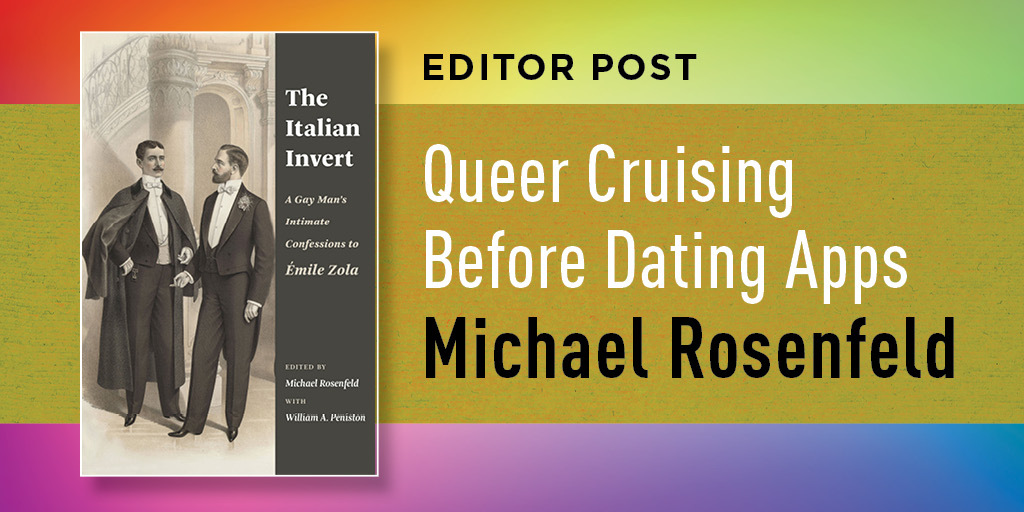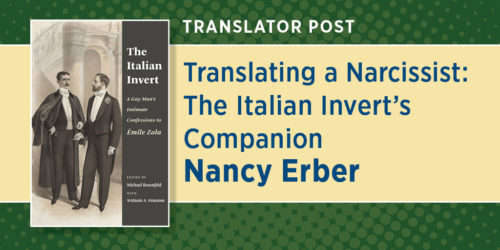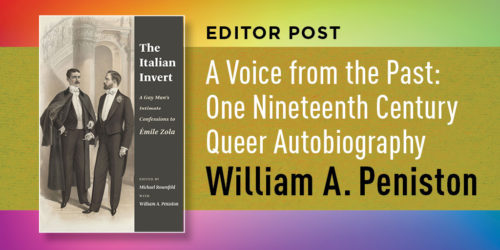Queer Cruising Before Dating Apps Michael Rosenfeld

Ever wonder how queer people met one another in the nineteenth century, when divulging one’s sexuality could lead to scandal and even arrest? In his tell-all confessions-letters, sent to French novelist Émile Zola in 1889 and to Dr. Georges Saint-Paul in 1896, an anonymous, young, and dashing Italian aristocrat reveals how he cruised men all over Europe and succeeded in finding lovers.
A first crucial step is the looks one gives other men. Even as a teenager, he already knew how important staring was: “Men struck me as charming and handsome because of their strength and vigor, and I felt attracted to them by an unknown force, an irresistible attraction. I used to like to watch handsome young men pass by in the street, and when someone pleased me, I would retrace my steps to see him again.” As a twenty-three-year old man when he writes to Zola, his obsession for handsome men still remains: “When I went to the post office to send the long letter that I had addressed to you, I was struck by the good looks of one of the postal clerks. Romans are really very handsome! Today I mailed several letters just so I could go back to see him, and I enjoyed talking to him and looking at him. He is definitely a charming man!!” The Italian assumes that the men who see his ardent gaze immediately guess what he wants: “If those of my sex turn around to look at me and smile at me, it’s because of the bold and persistent looks that I give them when a fire burns deep inside me.”
He admits to having a certain je ne sais quoi, a “gaydar,” which allows him to feel which men might also be queer: “As soon as a man in whom I immediately detect this vice and this passion looks at me, and as soon as our glances meet in a certain way, I feel a blow to my stomach; my blood rises to my face and head; my ears begin to tingle; my extremities freeze; and then I would be able to follow this stranger through countless dangers, over mountains and valleys, across deserts and forests of the wildest kind; I would follow him into the flames of Hell!”
Often, the exchanged looks lead to affairs, and the Italian gives examples of his successful cruising techniques and those of one of his lovers, nicknamed the Spaniard. The Italian writes that this young man stalked him for months, trying to find out who he was: “He followed me around everywhere for a long time, waiting under my balcony for hours on end, and walking along the riverbank when I was there. When I met him, he showed me the most passionate friendship.” They meet again a few years later and the Italian invites him over: “My young friend arrived, greatly changed in appearance, with a handsome mustache and a small beard like that of Henry III, dressed in the most perfect elegance. . . . We talked about unimportant things, but he looked at me with a dreamy gaze that I recognized, and as I complimented him on his handsome appearance, he told me: ‘It’s you who are still handsome, more handsome than ever!’ . . . When I came close to him, he grabbed both my hands, kissed them ardently, and murmured sweet nothings into my ear.”
Another example is even more telling of his seduction techniques and his persistence: “One day I met a young and handsome ticket controller on the train in Belgium—and I pestered him and spurred him on so much that finally he went to bed with me. I spent three nights with him in a very small lodging house, almost a hovel, where he lived and where I went to join him. This was really entertaining for me.”
The most detailed story is about a thirty-six-year old man from Milan, whom the Italian meets at a hotel in Rome:
The man was still young, enterprising, and bold. He didn’t stop staring at me all through dinner. He noticed my discomfort and the glances that I gave him from time to time. At the end of the meal, he approached me under some pretext and began to engage me in small talk. I could barely say a word because I was so nervous, and I replied to his conversation in almost unintelligible monosyllables. But without saying anything explicit, we understood each other. I felt it. I spent the rest of the evening strolling through the streets. . . . I found myself back at the hotel, and I can assure you that I was at the end of my rope. . . . I entered the lobby without glancing at anyone, and I pretended to look at the illustrated newspapers that were on the table. From the corner of my eye, I had already noticed him sitting on a sofa, and he was looking at me over his newspaper. I felt a shock to my stomach. Without even thinking about it, I gave him a long glance and left slowly. He left the lobby almost as soon as I did, and he followed me at a distance, nonchalantly watching me climb the stairs. I did this very slowly, turning around only once to see him as I climbed the stairs and went down the long hallway where by chance—by a happy chance, I should say—our two rooms were located. I went into my room and did not lock the door, naturally. . . . The door opened and the man appeared. Now as I write this, it seems to me that I’m still in that moment, so powerful was the sensation that I felt in my body and soul. . . . He came toward me very slowly without saying a word. . . . He came right up to me, sat on the left arm of the chair, and, taking hold of my head, tilted it upward and kissed me on the mouth without saying a word. I can’t describe to you what I felt, but it was a little like the delicious and delirious sensation that I have felt other times when the man I desired came close. We stayed like that for a long time, seeking each other’s lips hungrily and exchanging kisses on the mouth with mad, almost ferocious, lust.
The two men end up spending three weeks together in the hotel in Rome, but a very practical issue needs to be solved: How do you avoid lurking in the hallway of the hotel and risk being noticed by other guests? Very easy: “He changed rooms and took one next to mine, separated, or perhaps better put, united by a door that connected the two rooms. What we did together always seemed very natural to us, and we would talk and laugh before and after as if nothing had happened.”
The Italian Invert: A Gay Man’s Intimate Confessions to Émile Zola is not only a rare queer autobiography; it is also shows that love is universal and that the right seduction techniques will always work, even 120 years ago!
Michael D. Rosenfeld, Ph.D., postdoctoral research fellow, Université libre de Bruxelles, is the coeditor of The Italian Invert: A Gay Man’s Intimate Confessions to Émile Zola. He holds two doctorates, one in French literature and civilization from the Université Sorbonne Nouvelle–Paris 3 and one in French language and literature from the Catholic University of Louvain in Belgium.







